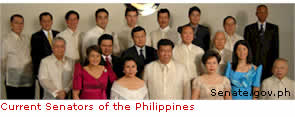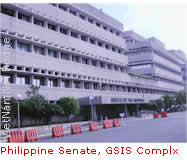In fact, the 1935 Constitution that ushered in the Philippine Commonwealth called specifically for a uni-cameral National Assembly. It was only in 1940 that it was changed by a constitutional amendment to a bi-cameral congress with a Senate and a House of Representatives. Pinoys at that time wanted to be just like their great white American colonizers. So if the US had two Houses of Congress, the PI (as it was then called) also had to have two Houses. Why settle for just one! That would be unfair! So a convoluted process of electing Philippine Senators was cobbled together. And now 70-years hence, we have Senators and Congressmen, just like the Americans do. But that's where the similarities end, American Senators are very different from Philippine Senators! American Senators have a specific constituency. They are elected by residents of the State they represent and they are directly answerable to that electorate. Philippine Senators on the other hand are elected "at large" by the entire nation--from Apari to Jolo. After all the votes are counted, the top 12 senatorial candidates who garnered the most number of votes are declared winners. While one can rightly say that since Philippine Senators are elected "at large" they are answerable to each and every Filipino. The actual effect, however, is they become answerable to no one! In the US, only the
Presidential and Vice Presidential candidates are voted "at large." But
even then, those candidates go through numerous State Primaries that act
as a filtering mechanism, so that only the best and most qualified
eventually make it to their party's national convention.
For example, under the
leadership of Franklin Drilon, the Philippine Senate rose to a level of
ineptness unparalleled in Philippine political history, passing a grand
total of four bills for an entire session. Once the
leader in Southeast Asia, the Philippines is now the laggard. If the country is ever to
surge ahead--or even just keep pace with its neighbors--it needs to
operate like a finely tuned engine, firing on all cylinders.
With a Senate like we have today, it will never happen. The
sooner we are rid of it, the sooner we can start moving forward.
|

 the odds
are she might just get her way before stepping down in 2010. Philippine
Senators, who are currently clamoring for Malacanang to release their
Pork-Barrel Funds--in time for the Holidays--must realize that their
days may be numbered. The Philippine Senate after all has, since its
ill-conceived inception 70-years ago, been a political basket case; a
ticking time-bomb waiting to wreak havoc on Philippine politics.
the odds
are she might just get her way before stepping down in 2010. Philippine
Senators, who are currently clamoring for Malacanang to release their
Pork-Barrel Funds--in time for the Holidays--must realize that their
days may be numbered. The Philippine Senate after all has, since its
ill-conceived inception 70-years ago, been a political basket case; a
ticking time-bomb waiting to wreak havoc on Philippine politics. There is no
such filtering mechanism in Philippine Senatorial politics. According to
Raul Lambino of Sigaw ng Bayan, for Philippine Senators, the only
qualification is "winability." As long as someone is popular enough to
make it into the "magic 12" they can always find backers and
financiers for their senatorial campaign. This is the reason why in
recent years, entertainers, comedians and pop stars have found their way
into the country's senatorial chambers, irrespective of whether they
were qualified or had the wherewithal to handle the challenges of their
elected
office.
There is no
such filtering mechanism in Philippine Senatorial politics. According to
Raul Lambino of Sigaw ng Bayan, for Philippine Senators, the only
qualification is "winability." As long as someone is popular enough to
make it into the "magic 12" they can always find backers and
financiers for their senatorial campaign. This is the reason why in
recent years, entertainers, comedians and pop stars have found their way
into the country's senatorial chambers, irrespective of whether they
were qualified or had the wherewithal to handle the challenges of their
elected
office. 
